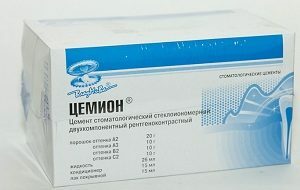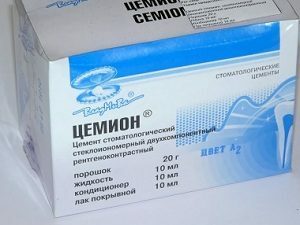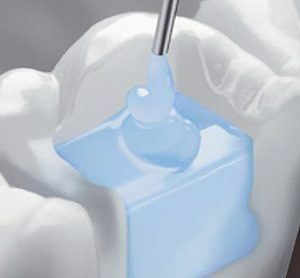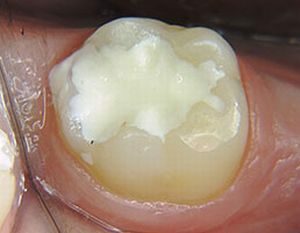 Teeth become brittle over time and, under the influence of various negative factors, begin to break down. In the dentistry special glass ionomers are used for their restoration and restoration, one of which is Zemion. This tool allows not only to restore the integrity of the teeth, but also to preserve their quality for a long period.
Teeth become brittle over time and, under the influence of various negative factors, begin to break down. In the dentistry special glass ionomers are used for their restoration and restoration, one of which is Zemion. This tool allows not only to restore the integrity of the teeth, but also to preserve their quality for a long period.
Zemion is a universal glass ionomer for radiopaque filling cements. This product has a chemical cure.
Cement is used for the restoration of damaged teeth. Its main purpose is to completely fill all the properties of the lost dentin tissue as a result of destruction in carious lesions and other pathological processes.
Contents
- Form release and component parts
- Material properties
- Scope of application
- Application instructions
- Special instructions
- Price
Forms and components
The material is a glass-ionomer cement that is chemically cured. Cement has chemical adhesion to dentin and enamel.
The process of forming the filling material occurs during the connection of the powder with the liquid that comes in the kit. In its structure, the powder is a comminuted aluminofluorosilicate glass. A liquid is an aqueous solution that is derived from polyacrylic acid in a modified form.
On sale is found in the form of a set of powder, solution, conditioner and coating varnish. The powder has a shade of A2, its volume is 20 grams, the volume of the liquid is 20 ml, the conditioner is 10 ml, the lacquer for the protective coating is 10 ml. In addition, the kit includes a dummy, a dropper cap, applicators in the amount of 10 pieces, a notepad for cement dilution.
Material properties
During the mixing of a powder with a liquid, a glass ionomer reaction appears almost immediately. During the reaction,  releases fluoride ions, which exert a strengthening effect on the dentine structure. It also has a disinfectant effect, prevents the emergence of secondary carious lesions.
releases fluoride ions, which exert a strengthening effect on the dentine structure. It also has a disinfectant effect, prevents the emergence of secondary carious lesions.
In addition, Zemion Universal has other properties:
- is biologically compatible with the structure of the dental tissues;
- has an increased level of strength up to 15 mPa;
- has increased resistance to acid erosion;
- during application creates a strong edge fit;
- has radiopaque qualities.
Scope
This tool is used in the following cases:
- for restoration of milk teeth( all classes of cavities);
- for filling open cavities with first and second class, as well as sealing fissures;
- for filling the cavities of the fifth class, but only if the aesthetic factors are not considered the main ones;
- is often used during the treatment of non-carious lesions of hard tissues, for example, to eliminate wedge-shaped defects, erosion of the enamel;
- is used to set temporary fillings during long-term therapy;
- for the restoration of damaged or destroyed tooth tissue under the crown;
- is a tool used for lining during sealing with composites and amalgam.
Instruction for use
Since during transport or storage, the SIC is kept at low temperatures, before using it, the material should be held at room temperature for about an hour.
 It is recommended that you shake well before using the product.
It is recommended that you shake well before using the product.
The dosage of the powder is carried out using a spoon-dummy, which is filled to the brim, the excess is removed with a special spatula. The liquid is dosed by a dropper, which is recommended to keep in a strictly vertical position and at a height, this will ensure an even and correct drop drop.
Cement mixing is performed on the surface of a notebook or glass. Mixing of the material should be done using a plastic or metal spatula every half a minute.
The use of glass ionomer is possible in two main variations.
To apply a gasket for insulation, 1 powder measure should be mixed, this is about 0.28 grams, with two drops of 0.1 gram solution. The freezing period is 2-2.5 minutes at 23 degrees Celsius. Increasing the temperature regime causes a decrease in the working time of the material, so it is recommended to mix cement on the surface of the cooled glass. Full hardening of the product from the moment of its end of mixing is 5-5.5 minutes.
To fill the fissure, two servings of powder are used, about 0.53 grams. In this amount of powder is added about 3 drops of solution, 0.15 ml. The working period of the facility lasts 1.5-2 minutes at 23 degrees Celsius. Elevated temperatures reduce the working period of the material, so its kneading is performed on the cooled surface of the glass. The total period of solidification of cement from the moment of complete termination of mixing is 3.5-4 minutes.
Before using the substance, the working cavity should be prepared in accordance with general principles. The prepared cavity should be washed, air dried.
After that, the cavity is treated with an air conditioner, thereby increasing the adhesion properties of cement to the surface of hard tooth tissues. The conditioner is put by a special brush or a swab from cotton wool for 15-20 seconds. After that, the working area is again rinsed with water and blown through with air to dry.
The material can be used without gasket. But if deep cavities are filled in the dentine area, which is located close to the pulp, then it is best to install a treatment pad with calcium hydroxide content. The rest of the dentin area should remain open, this is required to provide a chemical bond with Cesium.
The gasket should be applied before conditioning. If, after conditioning, the structure of  is broken, then a new portion of the tool is applied to restore it.
is broken, then a new portion of the tool is applied to restore it.
In the first hours after curing the product has an increased sensitivity to moisture, for this reason a special protective varnish is applied to the surface of the cement, this is done using an applicator or a stick of glass, then air drying takes 10-15 seconds.
After 15 minutes, the filling is processed and polished, this will form a correct bite. Final grinding and polishing of the seal is carried out not earlier than in a day. After that, the surface of the seal is again covered with a protective varnish.
Special instructions
When using the glass ionomer, dentists should adhere to the following rules:
- , if the patient experiences an allergy to the material, it is worth removing the substance and refusing to use it further;
- during application, the solution should not be allowed to enter the surface of the soft tissues of the oral cavity and the skin; if this happens, the components must be washed off with water;
- if liquid or airway gets into your eyes, you should immediately wash them with plenty of water and seek medical help.
The cost of
The average price of the Zemion kit is from 440 rubles to 500 rubles. The material can be ordered through the Internet or purchased in the markets of dental products.
